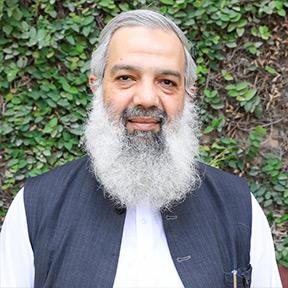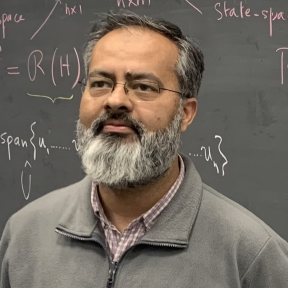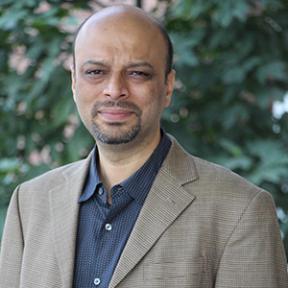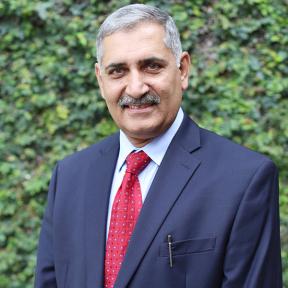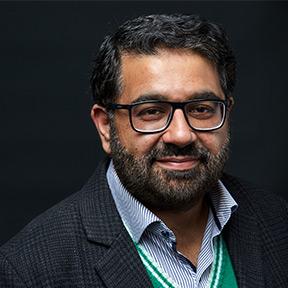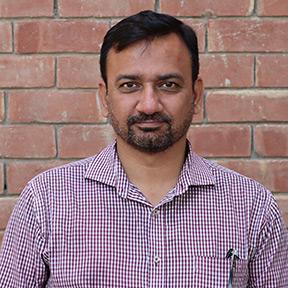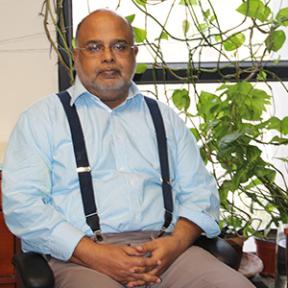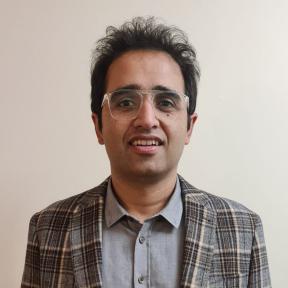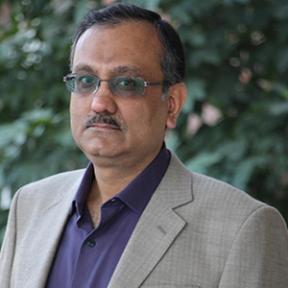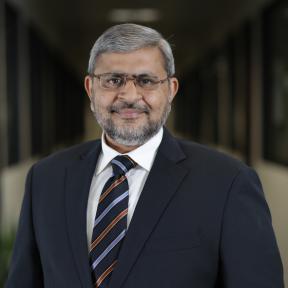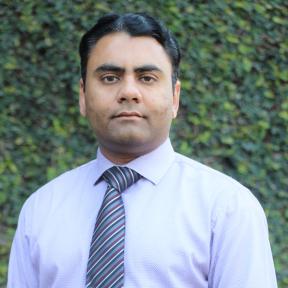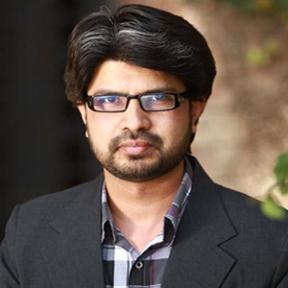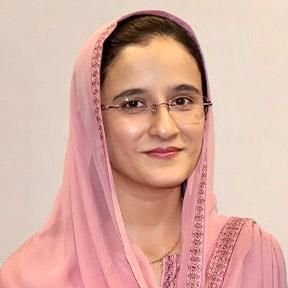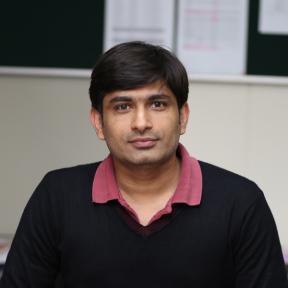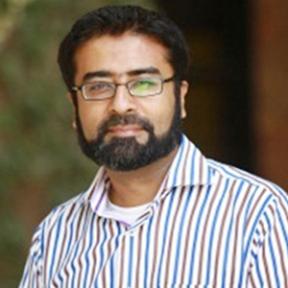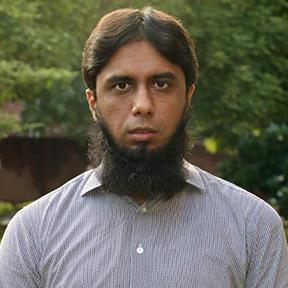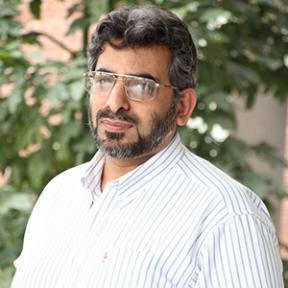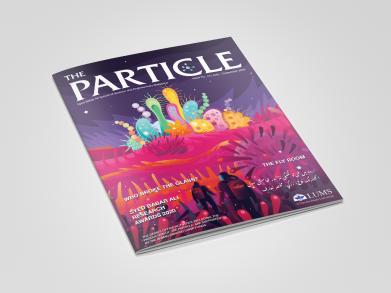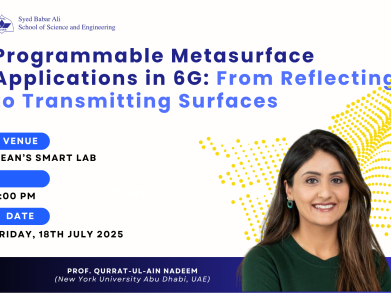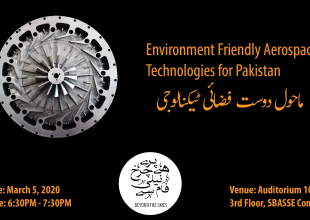Technologies developed by electrical engineers have enriched our lives in countless ways and revolutionized our daily environment. Electrical engineers gave the world the internet, telephone, satellite and TV networks along with power distribution networks. Electrical engineers develop new pacemakers for ailing hearts, ultrasonic diagnostic devices for detection of tumours, and NMR machines. They provide secure and reliable communication to expeditions in remote and dangerous locations and to astronauts in space. They are responsible for numerous household and personal items, from your smartphone, electronic wristwatch to your iPod. Electrical engineers work in multimedia, telecommunications, electric power, signal processing and control. They work with physicians on new diagnostic devices and with urban planners on new efficient vehicles. Their work makes our lives more interesting, effective and safe and increases our productivity and standard of living. Electrical engineering is grounded in mathematics and sciences. More than 23 full-time PhD research-active faculty members in all areas of EE with research labs in 9 clusters.
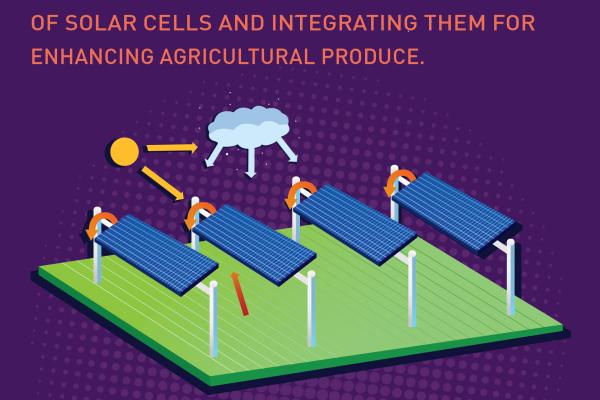
Dr. Nauman Zaffar Butt in the Electrical Engineering department leads our efforts on…
Dr. Nauman Zaffar Butt in the Electrical Engineering department leads our efforts on photovoltaics which has now crossed over into the realm of agriculture, to produce the budding field of agrivoltaics. Powering agricultural farms through solar energy requires creative designs in both the solar cells as well as how solar cells will be integrated into a solar system that can power agri-farms.
Dr. Butt's PhD student Hassan Imran has now produced an amazing body of work that helps achieve both of these tasks. Novel materials, novel designs of the heterofacial structure of solar cells and employing two-dimensional layers of graphene or carbon nano-tubes can boost the performance of solar cells, achieving almost thermodynamically maximum efficiencies. Creative ways to interface silicon based and organic-inorganic solar cell technologies helps achieve the best of both worlds.
Finally, Hassan has mathematically modeled the role of soil and orientation of solar panels, in achieving high efficiency crop yield from solar enhanced farmlands. This work has immense implications for the country which calls for innovative solutions to address critical problems at the food-energy-water confluence.
The quality of his work is evidenced by the four articles published in the world's leading journal on this topic:
- The IEEE Transactions on Electron Devices [here, here, here and here],
- The IEEE Journal of Photovoltaics [here],
- Solar Energy [here] and
- Renewable Energy [here],
- along with several conference proceedings.
The Water-Food-Energy nexus remains one of the six forefront areas being pursued at the Syed Babar Ali School of Science and Engineering.

In a world increasingly reliant on electricity, power outages can…
In a world increasingly reliant on electricity, power outages can bring daily life to a grinding halt. However, an innovative research by Chaudhry Talha Hassan and Dr Tariq Mahmood Jadoon from the Department of Electrical Engineering significantly accelerated the restoration of electric power after a major blackout by improving the resilience of smart grids. These grids integrate many distributed energy resources (DERs) such as solar panels, wind turbines and energy storage systems.
Shortly, after the study's publication in IEEE Xplore in August 2023, Sir Ganga Ram Hospital in Lahore experienced a power outage due to alleged mismanagement, forcing doctors to use torchlight to complete their procedures. A similar incident had occurred at Services Hospital Lahore less than a month earlier, impeding patient care. More recently, during the Sindh flash floods, the preservation of the Guddu power station played a crucial role in preventing a blackout that could have impacted 25% of Pakistan's population. These recurrent incidents underscore the timeliness of this research, where critical loads in a distribution feeder can be restored by harnessing power from neighboring DERs considering the power network as a cyber-physical power system.
When an entire city or neighborhood experiences an abrupt power loss, the urgency to restore electricity to critical facilities such as hospitals and emergency services is paramount. Bulk power distribution networks typically have a limited number of switchable lines and loads. This limitation can make it challenging to restore power, particularly in situations where many inductive loads are switched on simultaneously.
This is where the innovative concept of "microgrids" comes into play. The researchers have proposed the creation of these smaller, self-sustaining power networks that can swiftly bring power back to affected areas. Unlike the conventional top-to-bottom approach, the research emphasizes harnessing smart grids, using communication tech, reconfiguring networks, and integrating DERs. This ensures the rapid restoration of power to critical loads while addressing challenges like frequency control and practical factors such as switch types and communication constraints.
Inverter-dominated smart grids face unique challenges related to dynamic stability and lower inertia. The research introduces a multi-layered framework that integrates cyber-networks into the restoration process. It also emphasises the importance of monitoring the health of energy storage systems, ensuring safe charging and discharging strategies, and imposing constraints on frequency and voltage to maintain grid stability.
Moreover, the act of restoring power can sometimes introduce problems like system overload. To mitigate these potential issues, the study incorporates dynamic stability constraints into the restoration process, ensuring that the system remains stable even during the reconnection of numerous power sources.
To validate their concepts, the researchers employed computer simulations. These simulations create a virtual representation of the power system, allowing the team to experiment with different strategies without affecting the actual electricity supply.
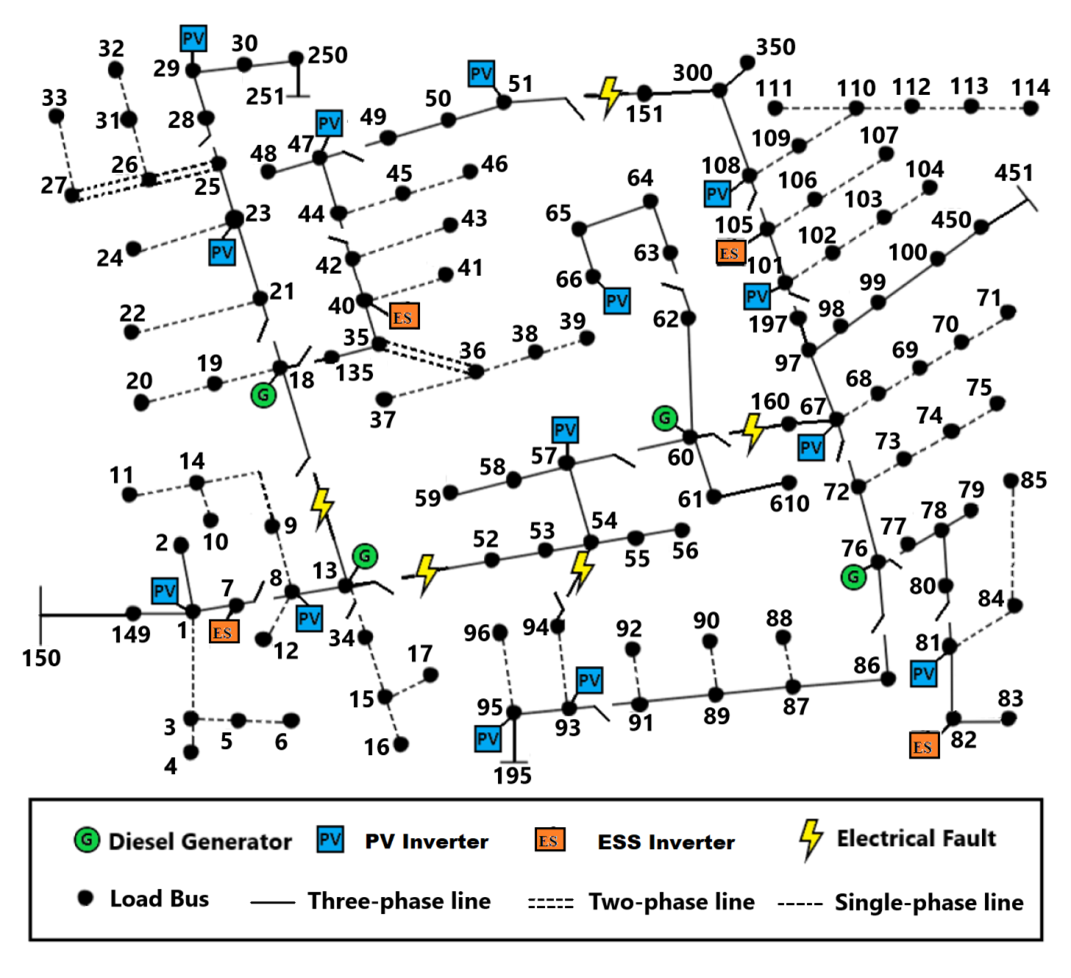
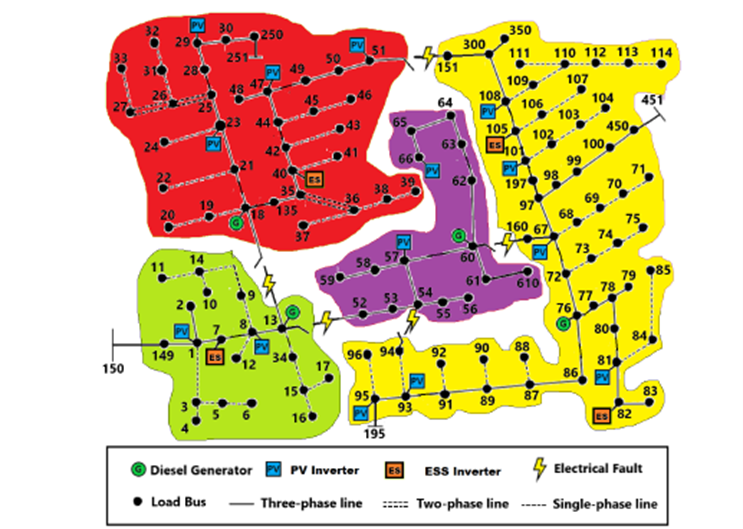
The research sheds light on the crucial role of synchronous generators as black-start distributed generators (DGs) for service restoration. Unlike renewable energy sources, high-inertia diesel generators can provide reliable power during emergencies. By including backup generators (BUGs) as dispatchable DGs in microgrids, the research demonstrates an innovative approach to harnessing power from non-dispatchable sources, enhancing microgrid stability, and expanding coverage.
Talha's research promises a more efficient and resilient future for power restoration. By harnessing the power of microgrids and cyber-physical systems, this approach promises to revolutionise how we think about restoring electricity in the face of adversity. As our world increasingly relies on electricity, innovations like these are essential for ensuring that the lights stay on even when the grid faces its darkest hours.
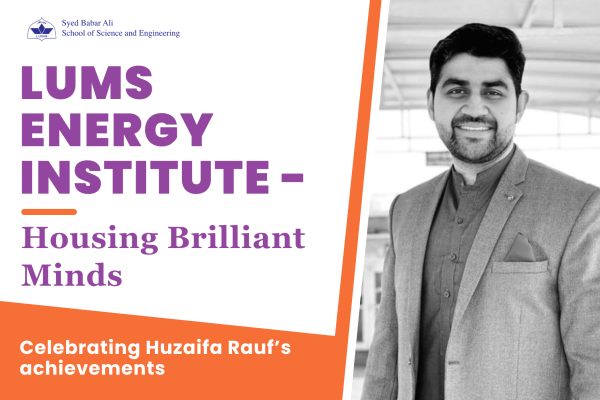
Huzaifa Rauf, a brilliant PhD scholar from the Department of…
Huzaifa Rauf, a brilliant PhD scholar from the Department of Electrical Engineering, has within a year earned two significant accolades - the prestigious “Center for Advanced Life Cycle Engineering (CALCE) at the University of Maryland Awards” for his outstanding performance and lasting contribution on “Safe Energy Storage Research”, and the publication of his research paper in the renowned Elsevier’s “Journal for Energy Storage”.
The rise and widespread adoption of electric vehicles (EVs) in recent decades has been primarily fueled by advancements in battery and power technologies and the urgent need to curb greenhouse gas emissions. However, unlike traditional fuel-driven vehicles, EVs face a significant challenge—the degradation of their batteries—which limits their overall lifespan. This issue is particularly concerning considering the resource-intensive nature of battery production, as short-lived batteries have an unintended adverse effect on the environment. Recognising this critical problem, Huzaifa is actively involved in a research group at SSE, LUMS Energy Institute, dedicated to enhancing the area of renewable energy analytics, smart grids, and energy efficiency.
During Huzaifa’s time as a visiting scholar at the University of Maryland, he worked under the supervision of Prof Michael Pecht (member SBASSE advisory board) and Dr Michael David Osterman at CALCE. His dedication and expertise in applying AI and machine learning for reliability improvement in electric vehicle batteries were instrumental in earning him the CALCE award, making him the first visiting PhD from any country to receive this prestigious honour from the Centre. As part of the award, Huzaifa also received a funding grant of $5,000, acknowledging his exceptional research accomplishments.
“Having worked at the initial phase of the battery degradation, swelling and thermal runaway project, I am confident that this stream is going to make a significant impact in domain of energy storage.” Huzaifa expressed great enthusiasm for having his work recognised.
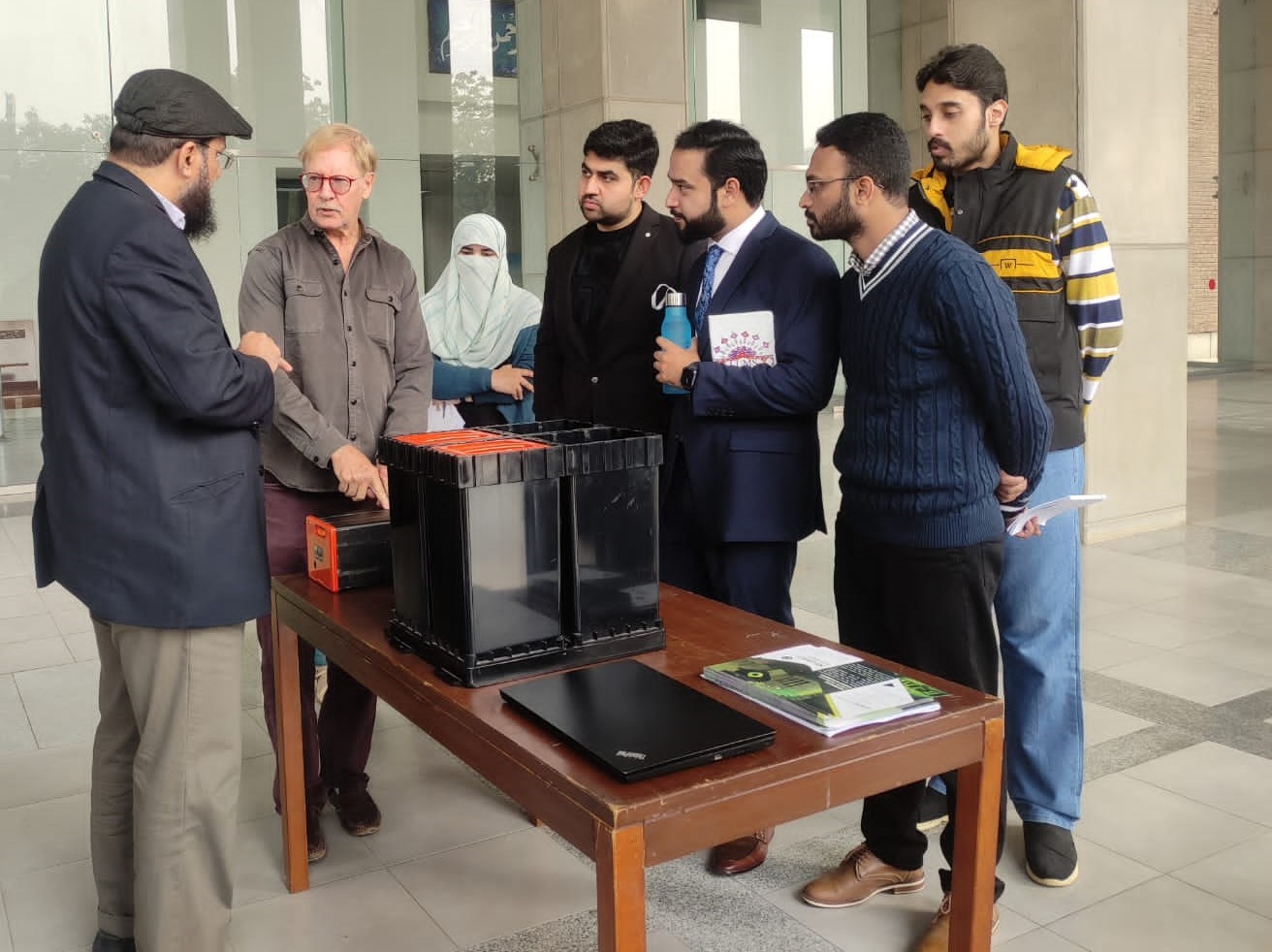
In addition to the research award, Huzaifa has also published a paper titled "A Novel Smart Feature Selection Strategy of Lithium-ion Battery Degradation Modelling for Electric Vehicles Based on Modern Machine Learning Algorithms", under the supervision of Dr Naveed Arshad, founder LUMS Energy Institute.
The paper highlights the importance of accurately predicting battery capacity loss to ensure the batteries' longevity, safety, and reliable operation. To achieve this, the researchers propose a smart feature selection (SFS) strategy-based machine learning framework. The SFS method selects relevant input parameters from battery data from the current and previous time steps, which are then utilized for model training and testing.
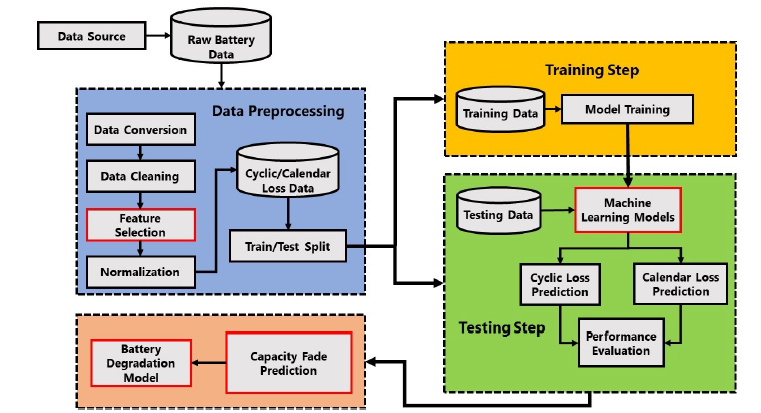
The results demonstrate that the proposed SFS method, in combination with various machine learning algorithms, significantly enhances the prediction accuracy and reduces the mean absolute error for battery capacity loss. The paper also emphasizes the importance of predicting a battery calendar, the degradation of a battery’s life over time whether or not it’s used, and cyclic loss, the gradual decrease in battery capacity caused by repeated charge and discharge cycles. Furthermore, it showcases the improved performance achieved by combining the SFS method with machine learning algorithms such as Gaussian Process Regression (GPR), random forest (RF), and XGBoost. This research presents a novel approach to feature selection-based machine learning for independently predicting battery calendar and cyclic loss, making it a valuable contribution to the field.
The publication highlights Huzaifa’s innovative approach to selecting smart features in modelling lithium-ion battery degradation, which has significant implications for electric vehicle performance and longevity. The research paper stands as a testament to his commitment to advancing the field of safe energy storage.
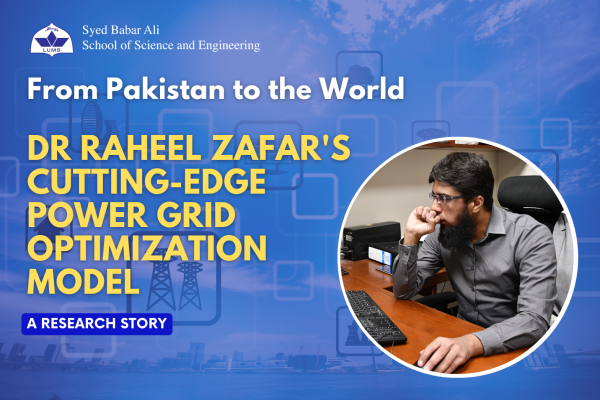
As summer approaches, high temperatures in Pakistan bring a host of…
As summer approaches, high temperatures in Pakistan bring a host of challenges beyond the physical discomfort of the heat. With frequent power outages plaguing the country’s energy grid, keeping cool and comfortable can be a struggle. Pakistan, like many other countries, is turning to renewable energy like rooftop solar panels and net metering to power homes and businesses. However, unlike technologically advanced countries, Pakistan does not have a distribution management system (DMS) to handle the influx of renewable energy from rooftop solar panels.
Dr Raheel Zafar, Assistant Professor from the Department of Electrical Engineering at LUMS, is working on solutions to help manage energy grids more efficiently and reliably, not only for Pakistan but globally. In 2023, he published two papers in IEEE Access, one as the first author of an international collaboration and the other one with his research assistant as the corresponding author. We will take a closer look at another one of Dr Raheel’s recently published papers in the reputed research journal, IEEE Transactions on Sustainable Energy titled Multi-Timescale Coordinated Control with Optimal Network Reconfiguration using Battery Storage Systems in Smart Distribution Grids
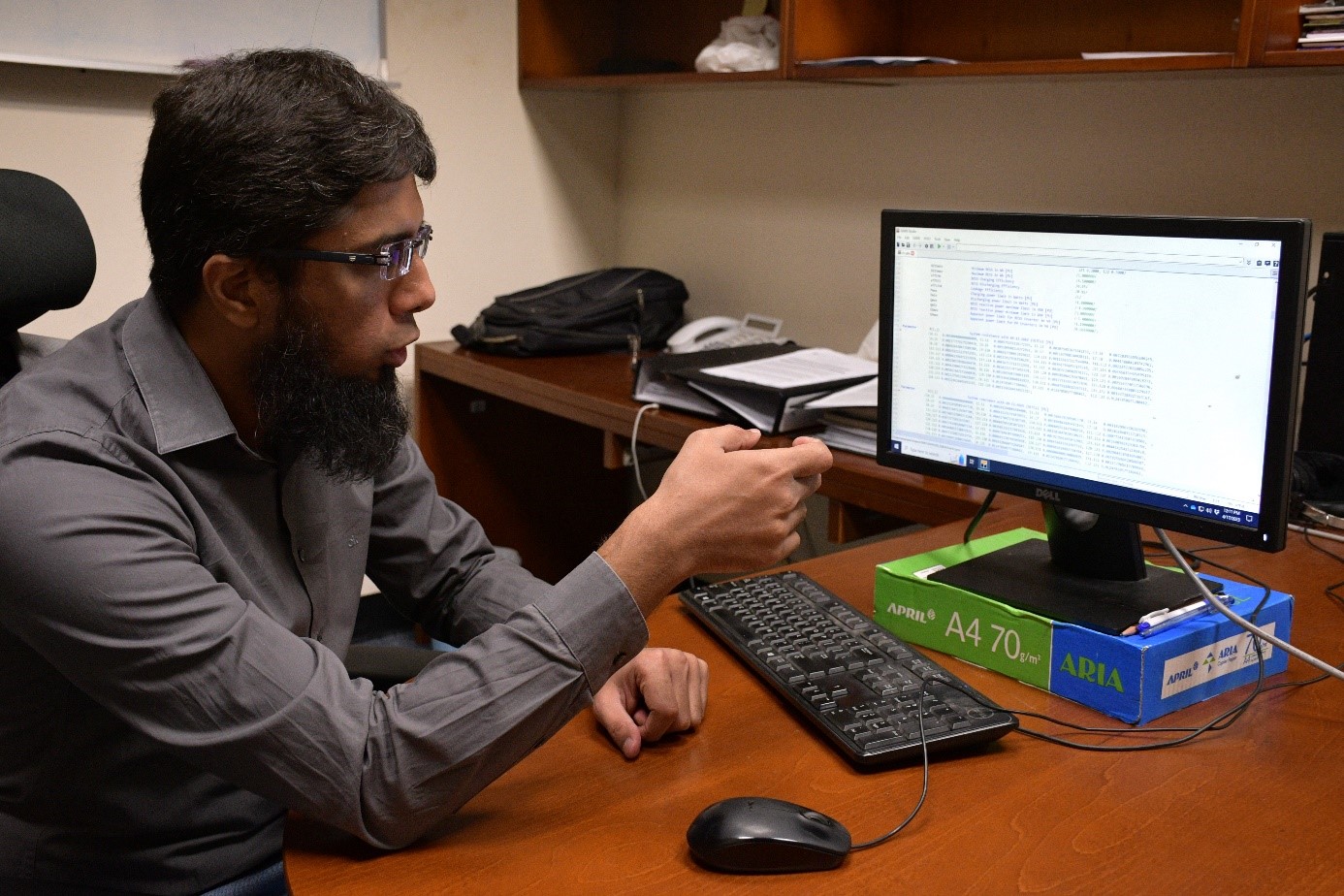
The paper proposes a new optimization framework to improve the performance of power distribution networks, which are responsible for bringing electricity from the transmission system to consumers. While the framework was developed by Dr Raheel, the co-author Dr Hemanshu R. Pota, Associate Professor at the University of New South Wales Canberra in Australia, provided valuable input during the structuring and revision stages of the article.
The paper deals with feeder reconfiguration, which involves changing the network’s topology by opening and closing switches to modify the connections between parts of the network. Dr Raheel proposes the co-optimization of feeder reconfiguration, creating a plan to schedule the use of (1) traditional voltage regulating devices, such as the on-load tap changer (OLTCs), to regulate the voltage of the traditional power grid, and (2) utility-scale distributed energy resources like battery energy storage systems and photovoltaic (solar energy) inverter.

To determine the optimal coordination between these different sources of power, Dr Raheel used a mathematical model called “mixed-integer second-order cone program”. This was solved using the GAMS software, an abbreviation for General Algebraic Modeling System, to find the best solution for the power grid, or “global optimum”, by exploring possible solutions and identifying the combinations that produce the best outcomes. Furthermore, the feasibility of the solution was tested using the Distribution System Simulator (OpenDSS) software. The model calculated an optimal switching plan on a daily basis, using 20-minute intervals for batteries and photovoltaic inverters, and hourly intervals for OLTCs.
Through this model, Dr Raheel was able to reduce energy losses by a staggering 24,1% and improve load balancing by 25%, compared to the current fixed topology system. The model could be used for day-ahead scheduling, making it a promising solution for optimizing power distribution.

At LUMS, the skies were not the limit but the starting point. On 13–14 September 2025, the Syed Babar Ali School of Science and Engineering (SBASSE), in collaboration with SUPARCO, SPADES, the Department of Electrical Engineering, RESOLVE-SUPARCO, and the Space Research Center (SRC-UCP), hosted SPACE CAMP 2025, a first-of-its-kind training camp in Pakistan that placed the science of satellites directly into the hands of students. Sixty carefully selected participants arrived with curiosity and left with the experience of building and launching model satellites, decoding flight data, and working alongside the country’s leading space scientists.
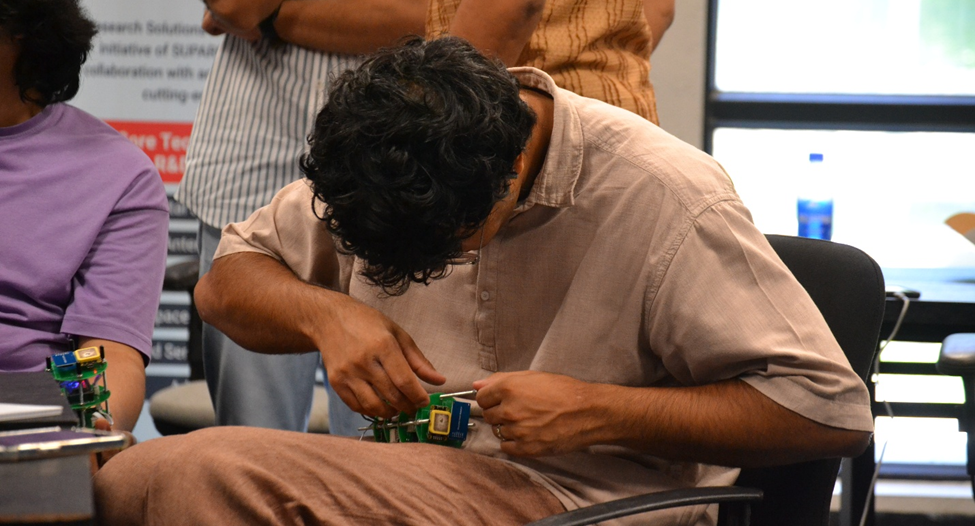
The camp offered a rare opportunity to follow the full lifecycle of a satellite, from design and assembly to launch and data analysis. With CANSAT and EYASSAT training kits, ground station setups, and flight model assemblies, students engaged in the intricate processes that underpin modern space missions.

"This is the kind of exposure we wished we had as students,” remarked a SUPARCO trainer, capturing the transformative nature of the experience.
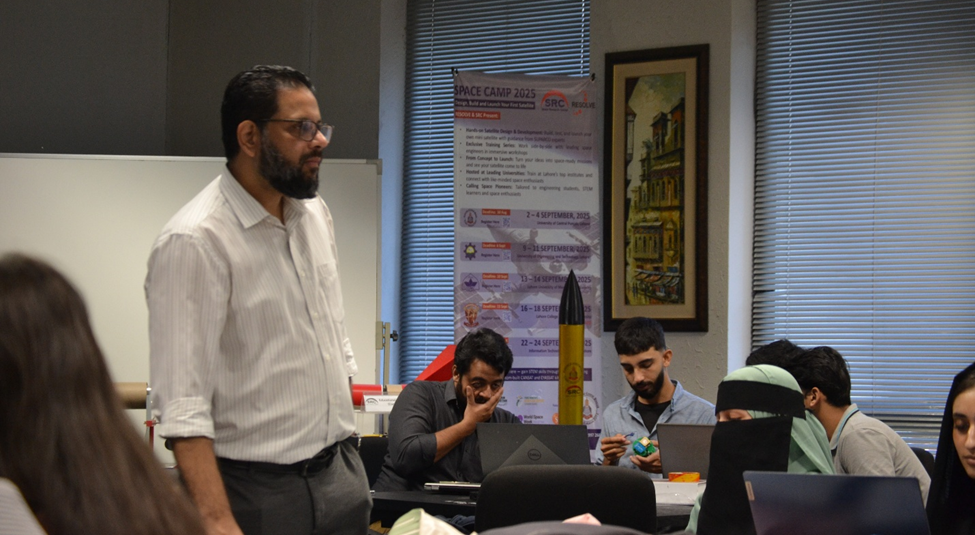
Guiding the participants were mentors who bridged theory and practice. From SUPARCO, experts including Dr. Muhammad Waseem, Mr. Ahsan Rafiq, Dr. Amad Ul Hassen, and Ms. Zahra Shuja Kazmi shared their expertise, while academic partners such as Dr. Kamran Saleem and Dr. Shakeel ur Rehman ensured the exercises were firmly rooted in scientific principles. Their combined mentorship not only strengthened technical skills but also encouraged students to imagine futures in aerospace, robotics, and satellite systems.
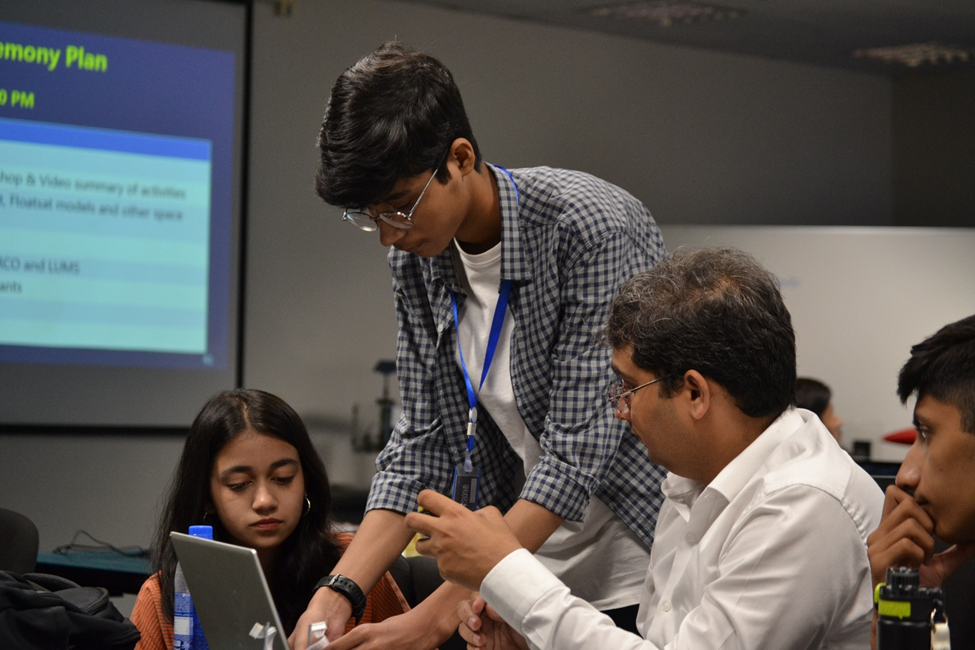
The closing ceremony carried both celebration and symbolism. The Director General of SUPARCO, Dr. Irfan Aslam, attended the event and presented souvenirs to LUMS leadership and faculty, including a historic image of the university captured by Pakistan’s first satellite.
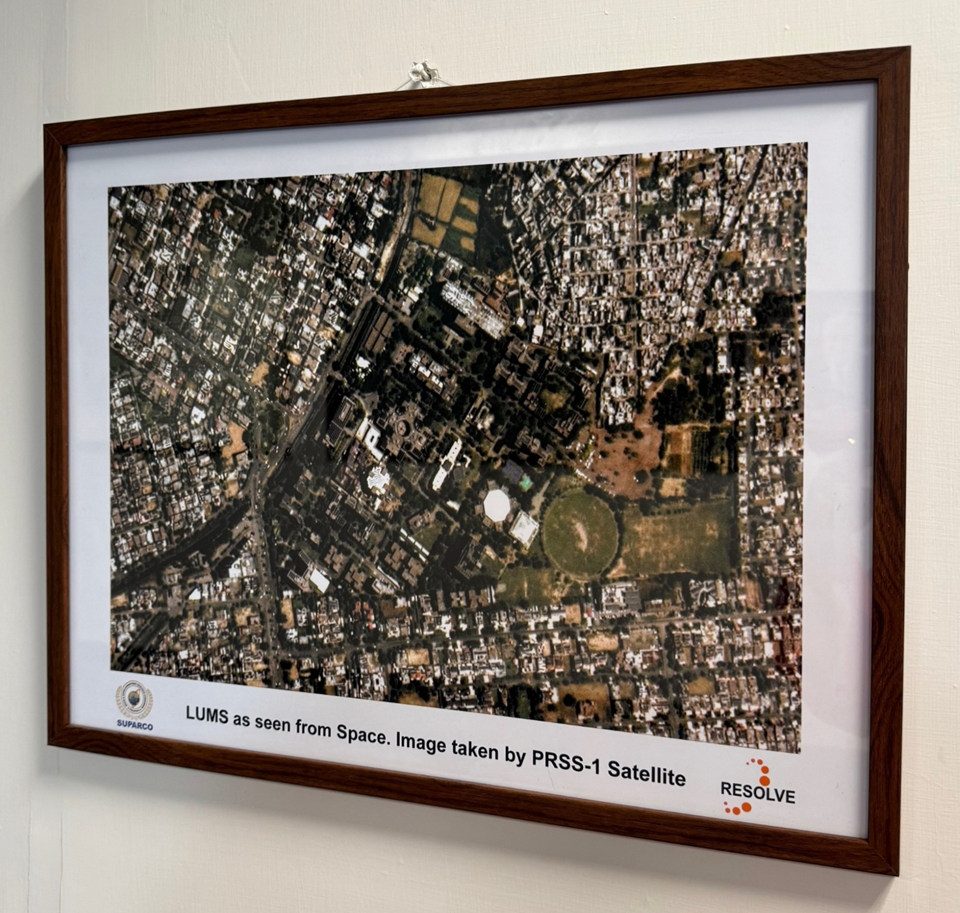
Certificates were also awarded to participants, recognising their successful completion of the programme and welcoming them into a growing community of young space enthusiasts.

The impact of SPACE CAMP 2025 extends well beyond its two days. For many, it was their first encounter with satellite hardware; for others, it was a moment of affirmation that their aspirations in space technology are both valid and achievable.
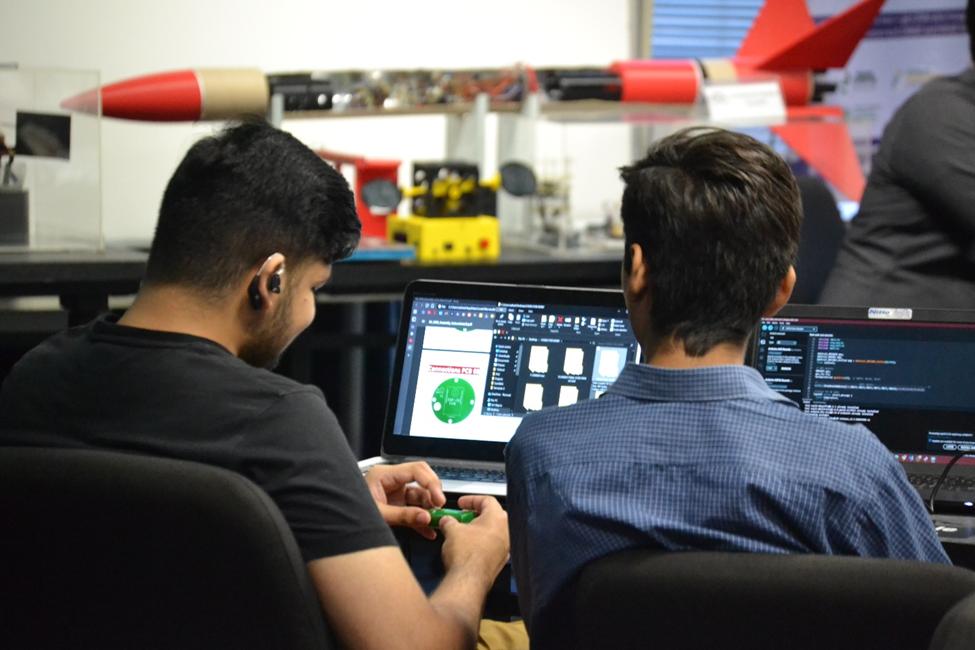
For LUMS, the camp reaffirmed its role as a national leader in science and innovation. By working with SUPARCO and its partners, SBASSE is equipping students with frontier skills while shaping Pakistan’s future in space exploration. And as the final prototype descended under its parachute during the camp’s closing simulation, it carried with it more than just data, it carried the aspirations of a new generation determined to reach beyond the horizon.
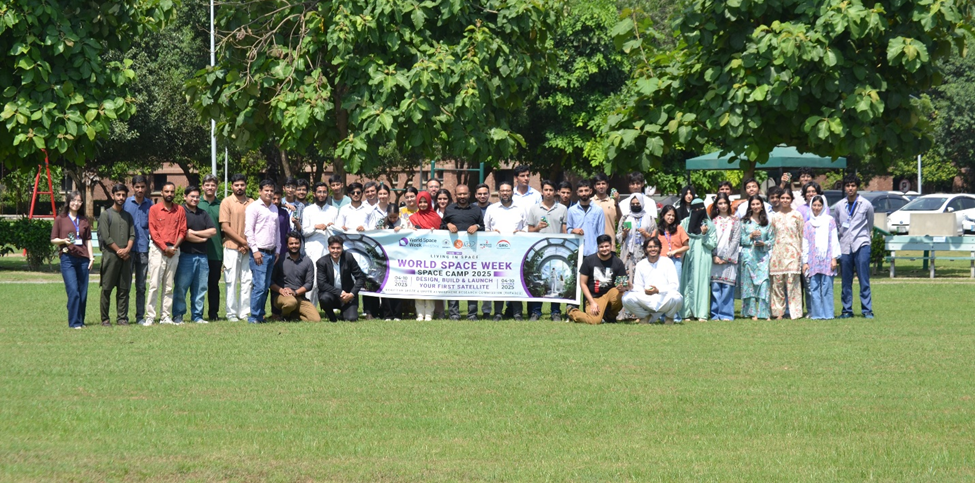
At LUMS, the skies were not the limit but the starting point. On 13–14 September 2025, the Syed Babar Ali School of…
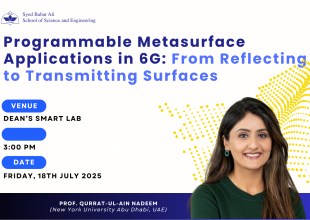
Qurrat-Ul-Ain Nadeem is an Assistant Professor of Electrical Engineering at New York University (NYU) Abu Dhabi, UAE, and an Associated Faculty at NYU Tandon School of Engineering, Brooklyn, USA. From 2019 to 2023, she worked as a Postdoctoral Research Fellow in the Electrical Engineering Department at the University of British Columbia (UBC), Canada. She received her M.S. and Ph.D. degrees in electrical engineering from King Abdullah University of Science and Technology (KAUST), Saudi Arabia in 2015 and 2018 respectively, and her B.S. degree in electrical engineering from Lahore University of Management Sciences (LUMS), Pakistan in 2013. Her research interests lie in the areas of communication theory, signal processing, and electromagnetics and antenna theory. Dr. Nadeem received the prestigious Paul Baron Young Scholar Award by The Marconi Society in 2018 for her work on full-dimension massive MIMO systems. She also received the NSERC Postdoctoral Fellowship Award in 2021, and has been recognized among the top 10 Rising Stars in Computer Networking and Communications by N2Women in 2024. She currently serves as an Editor of IEEE Transactions on Wireless Communications and IEEE Communications Letters, and has served as a Guest Editor of IEEE Network Magazine in 2024. She also serves as a co-chair of several tracks and workshops at flagship conferences of IEEE Communications Society.
Qurrat-Ul-Ain Nadeem is an Assistant Professor of Electrical Engineering at New York University (NYU) Abu Dhabi, UAE, and an Associated Faculty at NYU Tandon School of Engineering, Brooklyn, USA.
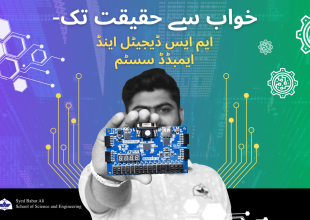
دنیا بھر میں جدت کے معیار کو برقرار رکھنے کے لئے آئے روز ٹیکنالوجی کی دنیا میں ترقی کی نئی مثالیں قائم ہو رہی ہیں۔ بیشتر ممالک کی طرح ٹیکنالوجی کی اس تگ و دو میں ہم قدم رہنے کے لیے لمز یونیورسٹی کے الیکٹرکل انجینیرنگ ڈیپارٹمینٹ نے رواں سال ایم ایس ڈیجیٹل اینڈ ایمبڈڈ سسٹم پروگرام کی شروعات کیں۔ یہ پروگرام اپنے طرز کا پہلا اور اکیلا پروگرام ہے ۔ جس کا مقصد ٹیکنالوجی کے حصول کے لیے بہترین ممکنہ راہ فراہم کرنا ہے ۔ حالیہ دور میں ڈیجیٹل اینڈ ایمبڈڈ سسٹم کی افادیت و استعمال کو زیرِ غور رکھتے ہوئے اس پروگرام کو تشکیل دیا گیا ہے۔
فروری2023 میں شروع ہونے والا یہ دلچسپ پروگرام بنیادی طور پر دو مضامین پر مشتمل ہے جنھیں تکنیکی زبان میں ڈیجیٹل انٹیگریٹڈ سرکٹ(IC) اور ایمبڈڈ سسٹم کہا جاتا ہے۔ اس پروگرام کے ذریعہ طلبہ کو نہ صرف جدید و نفیس ہارڈویر ذرائع سے روشناس کرایا جائے گا جو ڈیجیٹل سسٹم کی ڈیزایئننگ کے لیے اہم ہیں بلکہ ساتھ ہی ساتھ اعلی درجے کی تربیت کے ذریعے طلبہ کو ایسے سافٹ ویئر ہنروں سے متعارف کرایاجائے گا جو ایمبڈڈ سسٹم کی بین الا قوامی سافٹ ویئر مارکیٹ میں نہایت قدرو قیمت کے حامل ہیں۔
اس کورس کی تشکیل کے وقت مقامی مارکیٹ میں پیدا ہونے والے مسائل اور ضروریات کو زیر غور رکھا گیا ہے۔ اس پروگرام کا حصہ بننے والے طلبہ کو بنیادی سے اعلی درجے تک کی سسٹم ڈیزائننگ کی مشق دی جائے گی۔ اس تعلیم کے ذریعے نہ صرف وہ ڈیجیٹل اینڈ ایمبڈڈ سسٹم کی مقامی بلکہ بین الا قوامی مارکیٹ میں بھی اہم پیشرفت کرنے کے قابل ہوں گے اور الیکٹرانک اور سیمی کنڈکٹر انڈسٹری میں بھی اپنا لوہا منوا سکیں گے۔
اس کورس کے بارے میں مزید جاننے کے لئے ہم نے ایم ایس ڈیجیٹل اینڈ ایمبڈڈ سسٹم کی اولین جماعت کا حصہ بننے والے ہنر مندطالبعلم محمد احد کا انٹرویو کیا۔ احد کا تعلق بورے والا شہر سے ہے اور انہوں نے اپنی بیچلرز کی ڈگری کمپیوٹر انجینیرنگ میں یو ای ٹی UET ٹیکسیلا سے حاصل کی۔ ڈگری حاصل کرنے کے بعد احد نے نہ صرف انڈسٹری بلکہ فری لانسنگ میں قسمت آزمائی اور 10x نامی انجینیرنگ کمپنی میں ٹریننگ حاصل کرنے کا موقع پایا۔
احد کا کہنا تھا کہ بچپن سے ہی ریموٹ کنٹرول کار چلانے سے زیادہ دلچسپی انہیں اس چیز میں تھی کہ یہ چلتی کیسے ہے۔ ان کا کہنا تھا کہ ان کے بچپن میں آنے والی موبائل اور کمپیوٹر جیسی ایجادات نے جہاں دنیا کو حیران کردیا وہیں انہیں اتنا متاثر کیا کہ انہوں نے اس کم عمری میں ہی سوچ لیا کہ انہیں اسی علم کو حاصل کرنا ہے۔ بڑے ہوتے ہوئے جب احد نے ٹیکنالوجی کو پوری دنیا پہ قابض ہوتے دیکھا تو ان کا یہ ارادہ مزید پختہ ہو گیا۔
10x انجینیرنگ میں ٹرینینگ کے دوران انہیں 10x انجینیرنگ کے LinkedIn پیج سےلمز کے ایم ایس ڈیجیٹل اینڈ ایمبڈڈ سسٹم پروگرام کا علم ہوا۔ وہ اس پروگرام کے بارے میں جانتے ہی سمجھ گئے کہ یہی وہ موقع ہے جسکی انہیں تلاش تھی اور انہوں نے بلا تاخیر اس کے لئے درخواست جمع کرائی جہاں ان کا انتخاب ہوا اور وہ ان چند خوش نصیب لوگوں میں شامل ہو سکے جنھیں اس پروگرام کے پہلے دستے کے طور پر چنا گیا۔
احد کا کہنا تھا کہ اس کورس میں کثیرالاہمیت تجرباتی تعلیم, پروجیکٹس اور لیکچرز کے ذریعے ان کی تکنیکی ہنر اور ذہنی قابلیت کو ترقی حاصل ہوئی. ان کا کہنا تھا کہ اس سے قبل (Field Programmable Gate) FGPA Array) جیسا آلہ انہیں دستیاب نہیں تھا۔ لیکن اس کورس میں انہیں اس جدید آلے کی رسائی حاصل ہوئی ۔اس کے ذریعے آپ فیلڈ پر موجود اپنے خیالات کو عملی تشکیل دے سکتے ہیں ۔ایمبڈڈ سسٹم کی فیلڈ میں کام کرنے والوں کے لئے یہ بہترین مو قع فراہم کرتا ہے۔
احد کا مزید کہنا تھا کہ چار ماہ کے مختصر عرصے میں جدید طرز کی تجربہ گاہوں، آلات ،ورکشاپس اورصنعتی دوروں کی صورت میں ملنے والی تعلیم نے انہیں ابھی سے اس قابل بنا دیا ہے کہ وہ ایک اساسی درجے کی ایپ تیار کر سکیں۔ پراسیسر اور کنٹرولر کی کوڈنگ اور ڈیزائیننگ بھی اب ان کے لیے مشکل کام نہیں۔ مختصراً اس کورس کے مواد سے ان کی سوچنے سمجھنے کی صلاحیتوں اور تکنیکی قابلیت کو بے حد فروغ ملا ہے۔
جاتے جاتے احد کا کہنا تھا کہ یہ پروگرام ہر لحاظ سے ان کی امیدوں سے بڑھ کر ثابت ہوا اور وہ ڈیجیٹل اینڈ ایمبڈڈ سسٹم کے شعبے سے منسلک ہر شخص کو یہ تجویز دیں گے کہ اس کورس کا حصہ بنیں۔ انھوں نے مزید کہا کہ اس کورس کے ذریعے انہیں سیکھنے کے ایسے مواقع فراہم ہوئے ہیں جس سے وہ اپنے سیلیکون ویلی میں کام کرنے کے خواب کو عملی جامہ پہنا سکیں گے اور اس کے لیے وہ لمز کے تہہ دل سے شکر گزار ہیں۔

دنیا بھر میں جدت کے معیار کو برقرار رکھنے کے لئے آئے روز ٹیکنالوجی کی دنیا میں ترقی کی نئی مثالیں قائم ہو رہی…

